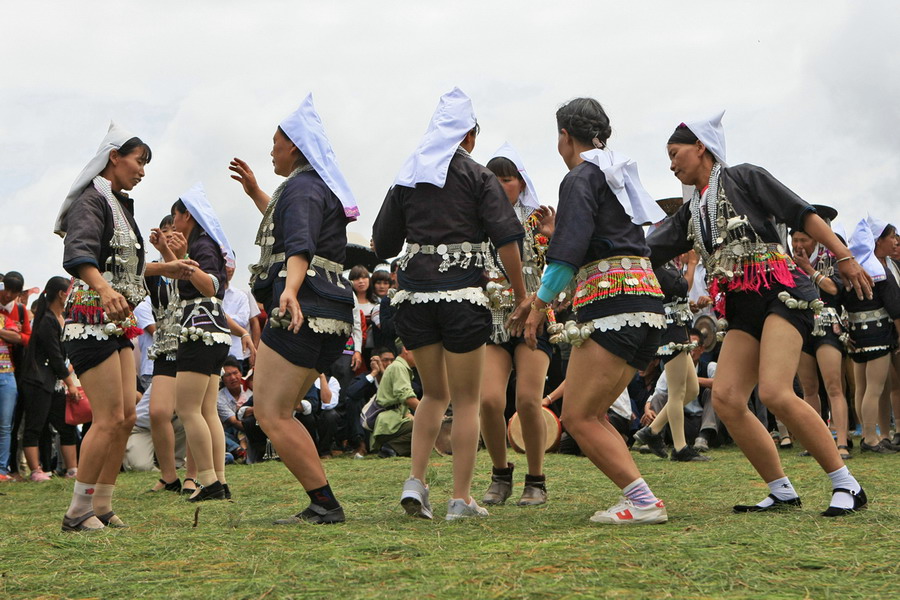

The Yiche (Yicyu) branch of the Hani Nationality
As a branch of the Hani ethnic minority, the Yiche people with a population of about 20,000 mainly live in Chepu Village Area of Yangjie Town, Honghe County.
Apart from these traditional religious beliefs and festivals such as Zhatele, Yangana, and Kuzhazha Angtuma, the Yiche people spend a peculiar festival named "Yangana" (locally called "Girls Street Festival" in lunar March).

The Yiche or Yicyu people are a branch of the Hani people with a population of about 23.000. They inhabit several areas of Honghe County, especially some villages of Dayangjie (called Yiche Township by the locals), Langdi and Chegu Township. Most of the Yeche villages are situated in the southern side of the Yuanjiang River, usually in the middle heights of the mountains. Their midst mountain in the back of the terrace fields carefully cultivated make the Yiche living environment one of the most beautiful in China.
They build their houses in the mountain, with the forest behind them and their fields before, as they think this is the best way of being protected from the floods. The houses generally face to the south. The Yiche have their own language, a dialect of the Haya dialect of the Hani language. Speaking their dialect they can communicate with some other branches of the Hani that live in the vicinity, as the Bugong, Lami, Ruby and Rumei.
Most of the Yiche history is common with other Hani branches; they have also legends about a time when they very powerful, the masters of big kingdom established on the shores of a big lake, maybe located in the vicinity of Dianchi Lake and Kunming City; and of a time of defeat and incessant migrations. According to their legends and historical traditions, in the Tang dynasty they migrated to the south with other Hani tribes. Then they settled as an independent tribe in the oriental slopes of the Ailaoshan mountains. According to the genealogies that they preserve carefully (as other branches of the Hani do), they have been living in their current localization the last 1,000 years. Their ancestor was one of the grandsons of Yingzhe (the Hani hero) whose name was Yiche (the whole tribe took the name of this ancestor). Yiche was the third son of the fifth son of Yingzhe, the Hani leader that, according to their legends, led the people in a big migration to the part of Yunnan Province they inhabit nowadays.
Their common history of the Yezhe with the rest of the Hani, is the reason of their linguistic and cultural similarities. Their separation during the last 1.000 years explains their differences.
Their language is considered a dialect of the Hani language; a term so wide that is divided in three main dialects reflecting the way six major ethnic groups speak. The Yiche language belongs to the Hani dialect of the Hani language.
There are three main characteristic that differentiate the Yiche people from other branches of the Hani:
1. The traditional dress of the women that due to their shorts trousers, has been frequently used in books and brochures emphasizing the erotic aspects of the ethnic minorities. "They also wear conical hats, similar to the Jino people, and shortsleeved blue blouses held together by five-colored girdles. The clothes are layered one on top of each other, numbering from six to more than a dozen. ... The layers indicate a family's financial standing. Women wear black shorts with pleats at the legs." (2)
2. Their retarded marriage, called lihhahha in their language. The marriages of the Yiche people are arranged by their parents when they are very young, when the bride-price is paid. After the marriage the husband and wife don't life together, but with their own parents. The wife, however, must visit her husband every twelve days until giving birth. During this period of lihhahha the wife has the freedom to have sexual intercourse with any man she likes.
3. Their third special custom is the way they celebrated the Kuzhazha festival. Kuzhaza festival, celebrated at the beginning of the rainy season, is one of the main festivals of the Hani. But among the Yiche this celebration is usually enjoyed with crazy intensity; as the people dress with a kind of fantastic or other sex clothes; and in the climax, their dance simulate the sexual act , as a mean to ask for increase in the population, rice, livestock, etc.
Other interesting festival is the Stone Carnival (3): "It happens like wars in the ancient age, though no other weapons but stones are used. When the game begins, male adults from different villages come together to riversides and throw small stones at each other. People on each side seems like have been united as an army, and they are now exactly in a fight against their enemies on the other side--the atmosphere feels tense and dangerous, just like a real war. People at the first sight of such a "battle" must be confused, are they acting like their ancestors in real experience? However, according to old peoples' recount, this kind of "battle" is in fact in no means related to real wars or battles, but for corns--people can't get good harvest unless such a "battle" is held."
You will only receive emails that you permitted upon submission and your email address will never be shared with any third parties without your express permission.
